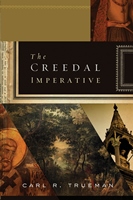Dr. Carl Trueman is Professor of Church History at Westminster Theological Seminary in Philadelphia, and he serves on our Board of Reference here at Books At a Glance. We appreciate his work in historical theology, and his 2012 The Creedal Imperative seems to fill a particular niche, addressing a question not often considered in the life of many churches. We caught up with him for this interview, and we’re happy to share it with our readers.
Books At a Glance (Fred Zaspel):
Please tell us how this subject came to interest you and how this book came about.
Trueman:
During the 1990s, I spent a lot of time wrestling with the issue of church authority and also with the means whereby the gospel could be transmitted from generation to generation. Eventually, I became convinced that the Bible itself points to the answer: an ecclesiastical office (eldership) and an agreed content (the apostolic gospel) which is to be passed on using forms of sound words. Confessional Christianity in the proper sense is an attempt to meet these two biblical criteria.
Books At a Glance:
It is easy to see why the historic creeds and confessions would be neglected in churches and denomination who no longer affirm the truths enshrined in them. But why, in your opinion, have these historic statements of faith fallen into such general disuse in churches who would actually affirm their agreement with them?
Trueman:
It is hard to generalize but it would appear that such neglect is often rooted in a stated desire to let the Bible have supreme authority in matters of doctrine and life, which is, if course, a good thing. I also believe that churches are often unconsciously subject to unbiblical cultural tendencies which push them away from the use of confessions: for example, a low view of the past; consumerism; and a fear of drawing clear lines and thus excluding people.
 Books At a Glance:
Books At a Glance:
What in your estimation are the most important reasons for employing the creeds in congregational use? Please summarize for us your biblical reasoning for this “creedal imperative.” And explain how doctrine is to be understood as doxological.
Trueman:
This question really requires an elaborate answer (which is why I wrote the book) but, to summarize, I would argue that creeds and confessions are the best way of meeting Paul’s mandate to Timothy, that he hold fast to a form of sound words. They also connect doctrinal content to church structure, a point which is vital to the preservation and propagation of the gospel.
As to doxology, praise of God requires knowing who he is and what he has done, does do, and will do. Creeds and confessions give wonderful expression to that.
Books At a Glance:
What was the earliest “creed” or “rule of faith,” and what was its or their role in the earliest centuries of the church?
Trueman:
The so-called Rule of Faith has its origins in the writings of figures such as Ignatius of Antioch and finds its most famous form in writers like Tertullian and Irenaeus in the later second and third centuries. It offers a basic outline of Christian truth in a manner akin to the later Apostles’ Creed. It does not occur in the same linguistic form every time, however, indicating that it was the conceptual content and not the language which was that which was agreed upon. From the middle fourth century onwards, there is agreement that conceptual content and linguistic form need to be formally connected.
Books At a Glance:
What are the most helpful ways creeds and/or confessions can be put to use congregational life? And which of the ancient creeds would you most recommend for corporate use?
Trueman:
They have various uses, from defining and delimiting the power of the eldership to providing a framework for Christian education within the church. In the worship service, the Apostles’ Creed, the Nicene Creed and on occasion the Athanasian Creed can all be used with profit.
Books At a Glance:
Which creeds and/or confessions are put to public use at Cornerstone Presbyterian Church, where you are pastor? And just how are they put to use? Describe for us the role they have in your church’s corporate life. Is there any significant feedback you have received from your congregation that you can share with us?
Trueman:
We regularly recite the Apostles’ and Nicene Creed in worship. Occasionally we will also use a question and answer from a catechism (Shorter or Heidelberg). I can honestly say nobody has yet complained, and all of the feedback I have received has been positive. People seem to like the opportunity to express their faith corporately and also to identify with brothers and sisters throughout the ages and across the globe.
I also try to refer to the Westminster Standards or the Heidelberg Catechism in sermons (not every week but perhaps once a month) in order to familiarize the congregation with them as resources for basic Christian knowledge and also to demonstrate that they summarize the Bible rather than standing separate from it.
Books At a Glance:
Have you been encouraged with the response from this book so far?
Trueman:
On the whole, yes. I wanted to write a book which thoughtful Christians who do not use creeds or confessions would read and that, even if not persuaded, they would at least find the argument to be worth considering. If the correspondence and reviews I have received since publication are representative, then I seem to have achieved my purpose.
